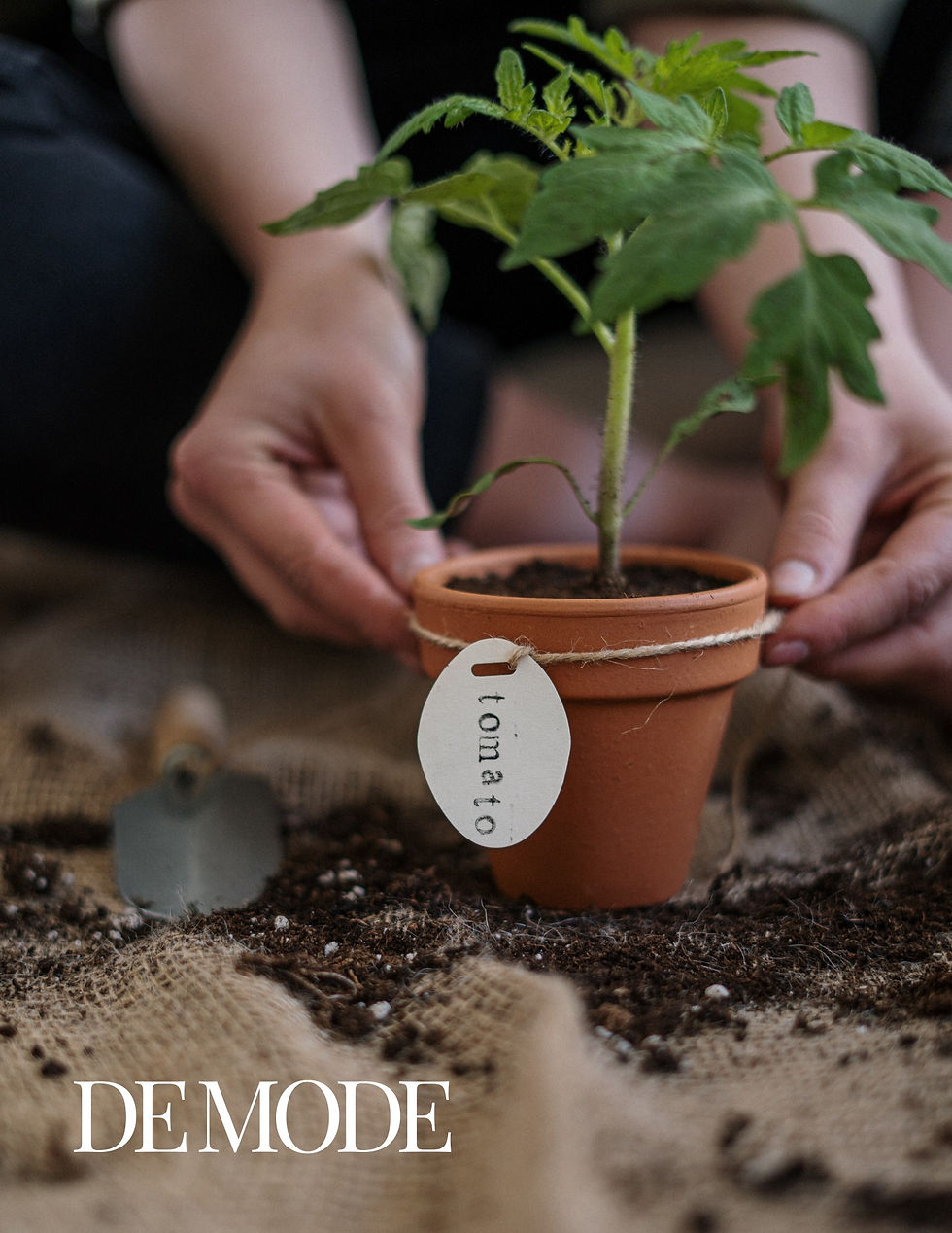ORIGINALLY PUBLISHED IN DE MODE | GARDENING
Article Published on: 23RD OCT 2023 | www.demodemagazine.com
Gardening is a timeless and fulfilling activity that allows us to connect with nature, beautify our surroundings, and reap the rewards of fresh produce or vibrant blooms. However, in today's world, it's more important than ever to adopt sustainable gardening practices to minimize our impact on the environment and preserve the natural world for future generations. This article explores eco-friendly tips and strategies to create greener, more sustainable gardens.
Soil Health and Composting
The foundation of any successful garden is healthy soil. Sustainable gardeners focus on building and maintaining the soil's health, reducing the need for synthetic fertilizers and pesticides. Here are some eco-friendly practices for soil health:
Composting: Compost kitchen scraps, yard waste, and organic matter to create nutrient-rich compost that improves soil structure and fertility.
No-till gardening: Avoid tilling the soil, which disrupts its natural ecosystem. Instead, use mulch and cover crops to improve soil structure and prevent erosion.
Mulching: Apply organic mulch like wood chips, straw, or compost to retain moisture, suppress weeds, and regulate soil temperature.

Water Conservation
Water is a precious resource, and conserving it in the garden is essential for sustainability. Here's how you can minimize water usage:
Drip irrigation: Install a drip irrigation system that delivers water directly to plant roots, reducing water wastage through evaporation.
Rainwater harvesting: Collect rainwater in barrels or cisterns for garden use, reducing the reliance on treated municipal water.
Xeriscaping: Choose drought-tolerant plants native to your region, which require less water and maintenance.
Use a rain gauge to monitor rainfall and adjust watering accordingly, avoiding overwatering.
Native and Climate-Appropriate Plants
Selecting plants that are well-suited to your local climate and soil conditions reduces the need for excessive watering and chemical inputs. Native plants, in particular, offer numerous benefits:
Biodiversity: Native plants attract local wildlife, supporting biodiversity.
Low maintenance: These plants are adapted to the local environment, reducing the need for pesticides and fertilizers.
Water efficiency: Natives typically require less water than exotic species.
Integrated Pest Management (IPM)
Instead of resorting to chemical pesticides that harm the environment, implement integrated pest management techniques:
Attract beneficial insects: Encourage the presence of beneficial insects like ladybugs and lacewings that naturally control pests.
Companion planting: Choose plant combinations that deter pests, such as marigolds to repel nematodes.
Handpick and prune: Regularly inspect your garden for pests and remove them manually.
Neem oil and diatomaceous earth: Use natural remedies like neem oil and diatomaceous earth to manage pest problems.
Reduce, Reuse, Recycle
Applying the principles of reduce, reuse, and recycle in the garden helps minimize waste and save resources:
Repurpose materials: Turn old containers, pallets, and other items into planters, trellises, and garden décor.
Reduce plastic use: Opt for biodegradable pots or reusable containers instead of disposable plastic ones.
Compost and mulch: Recycle yard waste and kitchen scraps into compost and mulch for a closed-loop system.

Energy Efficiency
Many gardening practices require energy, from mowing the lawn to operating power tools. To minimize your carbon footprint:
Use manual tools: Switch to manual tools like hand pruners, rakes, and push mowers whenever possible.
Solar-powered lights: Illuminate your garden with solar-powered lighting, reducing electricity consumption.
Organic Fertilizers
Conventional fertilizers can contribute to nutrient pollution in water bodies and harm the ecosystem. Opt for organic alternatives:
Compost: As mentioned earlier, compost is a fantastic natural fertilizer, rich in nutrients.
Organic matter: Incorporate well-rotted manure, leaf mold, and other organic materials to enrich your soil.
Organic fertilizers: Choose organic fertilizers such as bone meal, blood meal, or fish emulsion to provide essential nutrients to your plants.
Biodiversity
Encourage a diverse range of plant species in your garden to support a thriving ecosystem:
Plant a variety of flowers, shrubs, and trees to provide food and shelter for wildlife.
Include a mix of annuals and perennials to ensure year-round interest and nectar sources for pollinators.
Create habitat: Install birdhouses, bee hotels, and butterfly-friendly plants to attract beneficial wildlife.
Sustainable Lawn Care
Lawns consume a substantial amount of resources, from water to energy for maintenance. Consider alternative approaches:
Reduce lawn size: Replace part of your lawn with native plants or vegetable gardens to minimize water and energy use.
Mow high: Set your mower blade to a higher height to encourage deeper grass roots and reduce water needs.
Organic lawn care: Use organic fertilizers and avoid chemical herbicides and pesticides on your lawn.
Education and Community
Sustainability is not just about individual practices but also about sharing knowledge and building a sustainable gardening community:
Share knowledge: Educate yourself and others about sustainable gardening practices through local workshops, gardening clubs, or online forums.
Community gardens: Join or initiate a community garden project to collectively promote sustainability in your neighborhood.
Support local initiatives: Get involved with local environmental organizations and support policies that promote sustainable gardening practices.

Conclusion Sustainable gardening practices are essential in today's world to protect the environment, conserve resources, and foster biodiversity. By adopting eco-friendly tips like soil health, water conservation, native plants, and integrated pest management, you can create a greener, more sustainable garden that benefits both you and the planet. Sustainable gardening not only reduces your environmental impact but also enriches your gardening experience, creating a harmonious relationship with the natural world. It's a way to give back to the Earth and ensure a healthier future for generations to come.